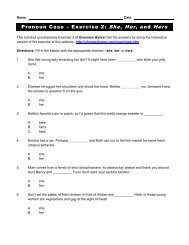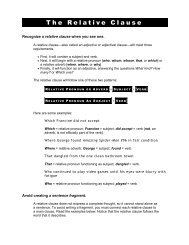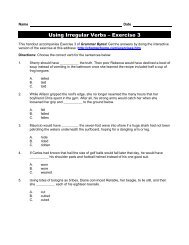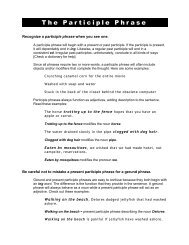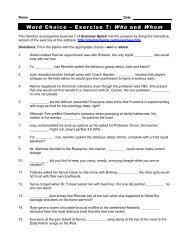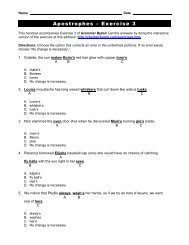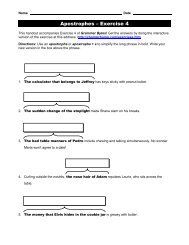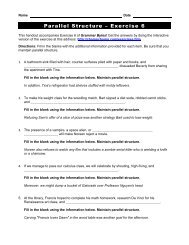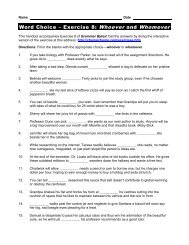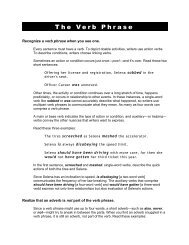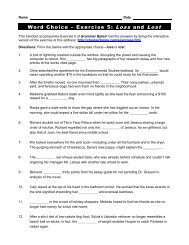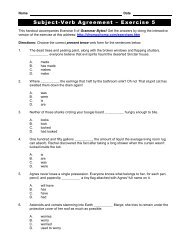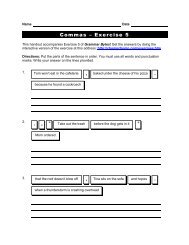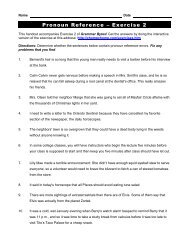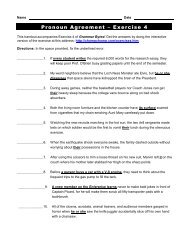The Subordinate Conjunction
The Subordinate Conjunction
The Subordinate Conjunction
Create successful ePaper yourself
Turn your PDF publications into a flip-book with our unique Google optimized e-Paper software.
T h e S u b o r d i n a t e C o n j u n c t i o n<br />
Recognize a subordinate conjunction when you see one.<br />
Some sentences are complex. Such sentences have two clauses, one main [or<br />
independent] and one subordinate [or dependent].<br />
<strong>The</strong> essential ingredient in a complex sentence is the subordinate conjunction:<br />
after<br />
although<br />
as<br />
because<br />
before<br />
even if<br />
even though<br />
if<br />
in order that<br />
once<br />
provided that<br />
rather than<br />
since<br />
so that<br />
than<br />
that<br />
though<br />
unless<br />
until<br />
when<br />
whenever<br />
where<br />
whereas<br />
wherever<br />
whether<br />
while<br />
why<br />
<strong>The</strong> subordinate conjunction has two jobs. First, it provides a necessary transition<br />
between the two ideas in the sentence. This transition will indicate a time, place,<br />
or cause and effect relationship. Here are some examples:<br />
Louisa will wash the sink full of her dirty dishes once her<br />
roommate Shane cleans his stubble and globs of shaving cream<br />
from the bathroom sink.<br />
We looked on top of the refrigerator, where Jenny will often hide<br />
a bag of chocolate chip cookies.<br />
Because her teeth were chattering in fear, Lynda clenched her<br />
jaw muscle while waiting for her turn to audition.<br />
<strong>The</strong> second job of the subordinate conjunction is to reduce the importance of one clause<br />
so that a reader understands which of the two ideas is more important. <strong>The</strong> more<br />
important idea belongs in the main clause, the less important in the clause introduced by<br />
the subordinate conjunction.<br />
Read these examples:<br />
As Samson blew out the birthday candles atop the cake , he<br />
burned the tip of his nose on a stubborn flame.<br />
Burning his nose > blowing out candles.<br />
Ronnie begins to sneeze violently whenever he opens the door<br />
to greet a fresh spring day.<br />
Sneezing violently > opening the door.
Even though Dana persevered at the calculus exam , she was<br />
only adding another F beside her name in Dr. Armour's grade book.<br />
Adding another F > persevering at the exam.<br />
Punctuate a complex sentence correctly.<br />
Complex sentences follow two common patterns:<br />
M AIN C L A U S E + Ø + S U B O R D I N A T E C L A U S E .<br />
Nicky shook her head and sighed Ø as she puzzled over the<br />
algebra problem.<br />
S U B O R D I N A T E C L A U S E + , + M A I N C L A U S E .<br />
When the doorbell rang, Nicky slammed shut her textbook and<br />
rose to pay for her pizza.<br />
Punctuation gets trickier when the subordinate clause begins with a relative pronoun like<br />
who, which, or where. Sometimes you will need a comma, and sometimes you won't,<br />
depending on whether the clause is essential or nonessential.<br />
When the information in the relative clause clarifies an otherwise general noun, the<br />
clause is essential and will follow the same pattern that you saw above:<br />
M AIN C L A U S E + Ø + E S S E N T I A L R E L A T I V E C L A U S E .<br />
Nicky paid the deliveryman Ø whose rusty hatchback choked<br />
and coughed in the driveway.<br />
Deliveryman is a general noun. Which one are we talking about <strong>The</strong> relative<br />
clause whose rusty hatchback choked and coughed in the driveway clarifies the<br />
restaurant employee we mean. <strong>The</strong> clause is thus essential and requires no punctuation.<br />
When a relative clause follows a specific noun, punctuation changes. <strong>The</strong> information in<br />
the relative clause is no longer as important, and the clause becomes nonessential.<br />
Nonessential clauses require you to use commas to connect them.<br />
M AIN C L A U S E + , + N O N E S S E N T I A L R E L A T I V E C L A U S E .<br />
Nicky paid Fernando, whose rusty hatchback choked and<br />
coughed in the driveway.
Fernando, the name of a unique restaurant employee, lets us know which deliveryman<br />
we mean. <strong>The</strong> information in the relative clause is no longer important and needs to be<br />
separated from the main clause with a comma.<br />
Relative clauses can also interrupt a main clause. When this happens, use no<br />
punctuation for an essential clause. But if the clause is nonessential, separate it with a<br />
comma in front and a comma behind. Take a look at these examples:<br />
After seeing the cheap tip, the man Ø who delivered Nicky's<br />
pizza Ø wished that he had driven more slowly.<br />
After seeing the cheap tip, Fernando, who delivered Nicky's<br />
pizza, wished that he had driven more slowly.<br />
©1997 - 2014 by Robin L. Simmons<br />
All Rights Reserved.



